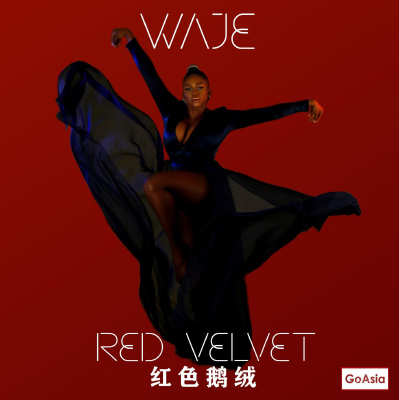|
||||||||||
| Home Nation World Business Opinion Lifestyle ChinAfrica Multimedia Columnists Documents Special Reports |
|
||||||||||
| Home Nation World Business Opinion Lifestyle ChinAfrica Multimedia Columnists Documents Special Reports |
| ChinAfrica |
| Nigerian musicians bring their musical gifts to China to deepen cross-cultural bonding |
| The two musicians want to encourage the world during this difficult time against the background of the COVID-19 pandemic |
| By Li Xiaoyu VOL.12 July ·2020-07-20 |

Being a universal language, music has always been seen as a way for people to connect with one another. With this mind, two Nigerian musicians have been promoting their music in China. Aituaje Iruobe, widely known as Waje, released an album and Cobhams Asuquo a new single in China in May, a part of Verse One Distribution's GoAsia campaign, which selects musicians in different genres and promotes them to Asian listeners. The two musicians want to encourage the world during this difficult time against the background of the COVID-19 pandemic and help African and Chinese people know each other better through their songs of love and encouragement.
Eclectic sound
Waje was born in Nigeria and grew up in Benin City, Edo State. Using the acronym of "words aren't just enough" as her stage name, she started her music career in 2007 and in no time got opportunities to perform with popular local and international artists. She has won over 20 awards and nominations worldwide and has become one of Africa's most respected and iconic female musicians.
With her 10-track album named Red Velvet, she is bringing her works to China for the first time in her career. According to her, the album is named so because of the significance of the color "red" and the smoothness, royalty and elegance of velvet. "It is focused on relationships – romantic relationships, familial between friends and the relationships with self. It is strongly rooted in love and conflict," she said.
It is this focus on relationships which draws her closer to China and the Chinese market. "Asian music has always been distinct and instantly recognizable. I like to think that my sound is exactly like that," she noted. In her eyes, the Chinese pop scene is also very strong as it has "found a way to infuse pop without losing its
originality." This is in line with her own style, she thinks.
Waje describes her music style as "eclectic," a fusion of R&B, Afrobeat and jazz with a huge reliance on horns. She believes that African music in general, and her music in particular, is set to appeal to a range of musical tastes in China and can create new cultural exchange stories.
A message of hope
Cobhams thinks that China is a very strategic place to release his song at this time. "We are about to witness the introduction of a brand new, true, organic and proudly African genre. It will be an eclectic experience for the Chinese market," he told ChinAfrica. On the other hand, "China has become the melting point for productive and creative diversity. This makes it a good launch pad to the world," he said.
With his new single Ordinary People, Cobhams wants to convey a message of hope and encouragement, one that encourages everyone to play a part in making the world better. "You don't need to be a superstar to make a difference because ordinary people make a difference every day," he said.
Indeed, the fact of being visually impaired didn't prevent him from making a difference in the Nigerian music industry, but instead it became "a gift." Before bringing his music to Asia, the 39-year-old singer, songwriter and music producer had earned tremendous success as a music artist in Africa, America and Europe. He is especially known for producing some of the finest artists and music TV shows in Nigeria.
"I believe that sight is a good thing but we are constantly being inundated by visual images that distract us more than they help us move forward," Cobhams told ChinAfrica. "To a large extent, I am able to escape that. As a result, I can focus on the things that matter more to me. I also have no shame or fear of failure because when you start out as I did, you have more to gain than to lose."

Cultural ambassadors
Both musicians said they are glad to notice that these days, more and more young Chinese people are becoming fond of African music. The musicians think the reason for this is the "magic power" of African music.
"Like Chinese music, African music is very rhythmic – each instrument tells its own story, makes you a part of its story and takes you on a different journey. It's also very rich and bold. Music is universal. You don't even need to know the words to connect to the music and mood of the musician," Waje explained.
For Cobhams, the strength of African music is its originality as well as the portrayal of a rich culture. "African music is currently a window to the African cultural experience," he said.
That is also the reason why he hopes his music would turn him into an ambassador of a rich culture and heritage. He expects that as his music gains acceptance, he can immerse himself in the equally rich culture of China and share his experience with people back home. "I also look forward to opening opportunities for collaborations as a means to expose the people of my country to Chinese culture," he added.
Waje also wants to play an active role in deepening the understanding between African and Chinese people through her music. "My music will expose Chinese people to our shared feelings, and as they get to know me, they will love me and my people – the people of Africa."
(Printed Edition Title: The Joy Of Music)
Comments to liaoyu@chinafrica.cn
| About Us | Contact Us | Advertise with Us | Subscribe |
| Copyright Beijing Review All rights reserved 京ICP备08005356号-5 京公网安备110102005860号 |